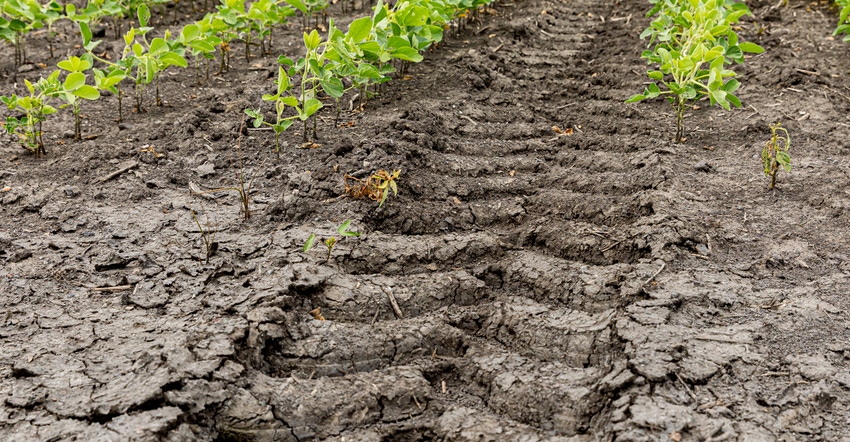January 21, 2020

“Don’t go into a field unless you have to. When you go in, have a reason why. Take any extra weight off.” That’s what Jake Kraayenbrink of AgriBrink said about the challenges of tackling soil compaction.
Speaking at the Corn Congress in Waterloo, N.Y., Kraayenbrink said that soil compaction happens because of loss of pore space, which leads to reduced water infiltration and increased ponding, runoff, crusting and, eventually, erosion.
It can also result in lower yields and can damage surrounding waterways, he said.
“When we compact soil, its effect lasts up to 10 years," Kraayenbrink said. "It's a huge thing. The deeper compaction goes deeper than it used to. Weight is why."
Tractors and implements have become larger and heavier over the years.
Kraayenbrink referenced research by Scott Shearer of The Ohio State University that looked at the effects of wheel traffic on a no-till cornfield averaging 200 bushels an acre. Shearer's research showed that a grain cart decreased yields by 13% under normal conditions and by 26% under wet conditions. A 36-row planter caused 5% yield loss under normal conditions and 15% yield loss under wet conditions, while a 16-row combine reduced yields by 12% in normal conditions and by 25% in wet conditions.
Applying manure in a narrow-spread pattern reduced yields by 6% under normal conditions and by 16% in wet conditions.
"Surface compaction is the number one yield robber," he said. "The accumulated loss is up to 20%.”
Wet weather can also exacerbate soil compaction. Farmers delay working in their fields because of rain. As they fear the window for completing their work is closing, they do so anyway even though it could compact the soil.
"We have a business to run. We have to get crops off. But the more we know what it costs us, the less likely we are to do this. Fragmented structure causes all kinds of problems.”
Check tire psi
Subsoil compaction can cause lasting damage in a field.
"We can compact a soil within seconds, but it takes decades for a soil to recover," he said. "As the organic levels in soil decrease, that gets more real."
Since the 1960s, tractor weight has increased by about 500 pounds per year. Reducing tire pounds per square inch can help alleviate compaction.
"You don't want greater than 14 psi on tires or you're changing the compaction on the soil," he said. “We wonder why our headlands are not producing. What other factor is there but compaction? It's something to keep in mind when buying equipment.
"It has a huge implication to compaction. If you don't keep it under 15 psi, you have 5% yield loss each year and up to 20% yield loss cumulatively before it levels out at about five years."
Know equipment weight
At “Compaction Action,” a demonstration held Sept. 7, 2017, by Innovative Farmers of Ontario, there was anecdotal evidence that showed the effects of equipment weight and psi on soil compaction.
Farmers at the event tested a number of tires, tracks and equipment to measure the effects on soil compaction, which was measured using a soil probe.
Equipment was fully loaded with maximum weight, and tire pressure was set based on weight and speed. Selected equipment was tested at road inflation pressure and at field pressure.
"Tire pressure is directly correlated to the pressure the soil feels," he said, adding that it's important to know the weight of the equipment. "A lot of us don't know the weight of our equipment so we don't know the right tire pressure.”
Deflating tires to under 15 pounds on a field can help decrease soil compaction.
"Don't go down the road that way," he said.
Using tire pressure adjustment equipment to reduce and restore tire pressure can help prevent compaction while adhering to the recommended road psi, he said.
Kraayenbrink sees psi as just one way of preventing compaction problems, along with crop rotation, reduced tillage and cover crops.
Sergeant writes from central New York.
About the Author(s)
You May Also Like




